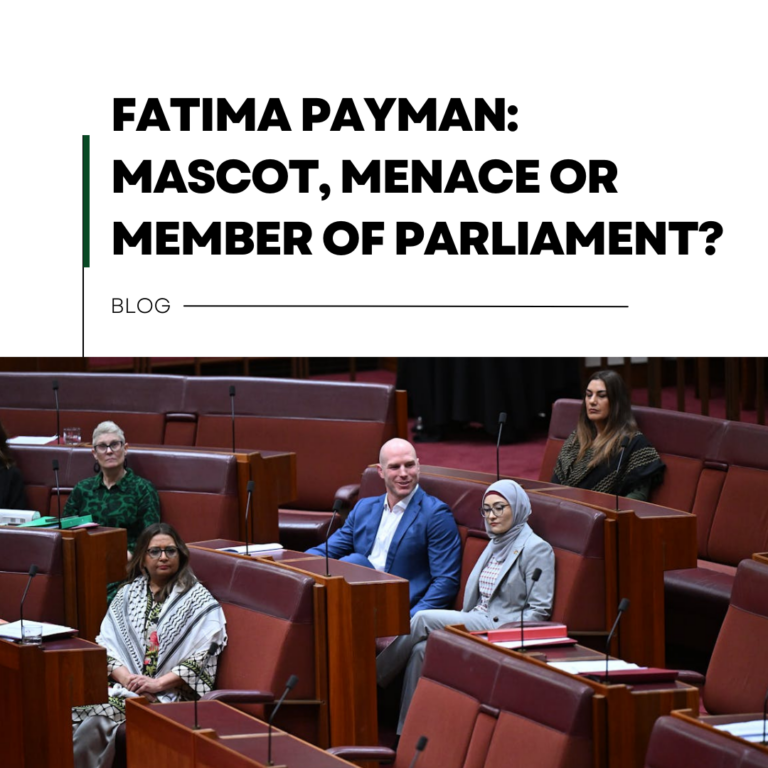In parliament for only two years, Western Australian Labor Senator Fatima Payman has received substantial attention, in the chamber and in the media. Payman received attention after her first Senate speech in September 2022. And she has received attention in May and June this year, for the views she has expressed on the Hamas-Israel war, and her own government’s position on Palestinian statehood. But this attention has been selective and subjective, rather than considering her work as a federal parliamentarian more broadly and objectively.
Payman’s public reception recalls the title of political scientist Mahmood Mamdani’s book Good Muslim, Bad Muslim. Her first Senate speech was received with varieties of admiration and affection, in parliament and online. Attention was paid to her appearance and biography, and primarily to the fact she was a young hijab-wearing woman – almost as though she were considered a sort of multicultural Muslim mascot for the Labor Party.
Now in 2024, Payman has been taken seriously, by both her prime minister and members of the opposition, as something like a mildly disruptive Muslim menace.
Why does Payman’s public conduct seem to stimulate affection and apprehension more readily than temperate intellectual engagement?
In 2022 Payman was liked; a young and articulate hijab-wearing woman, the child of Afghan refugees, whose first parliamentary speech contained many hopeful messages about an Australia in which diversity need not be only a source of smiling photo opportunities. The speech drew to a close with language that might strike sympathetic ears as guileless and good, and sceptical ears as youthful or idealistic:
“Let us not settle on multiculturalism being just a brand we associate with or take pride in as a nation but rather fully embrace it by caring for one another, accepting each other for who we are and what we can become, and ensuring all voices are heard at the table.”
Payman’s wishes were consonant with the Albanese government’s “Multicultural Framework Review,” launched in June 2023. Announcing the initiative, Minister for Immigration, Citizenship and Multicultural Affairs Andrew Giles portrayed it as distinctively Labor, in both short-term redress and long-term vision. Addressing implied Coalition failures, he said: “The Albanese Labor Government is turning the page on nine shameful years of fearmongering and division surrounding multicultural Australians. This review is a concrete step towards an inclusive country where we are able to harness the talents of all Australians.”
And drawing on a longer Labor tradition Giles was pleased to note that: “The Review coincides with the 50th anniversary of the Whitlam Government’s 1973 report ‘A Multi-cultural Society for the Future’, which marked the birth of contemporary multicultural Australia.”
There was heartening reciprocity between this Multicultural Framework Review and Payman’s first-person advocacy of productive multiculturalism in her first Senate speech. This dialectic of policy and personal spheres also seemed to be reflected more broadly in the Labor government elected in 2022. Payman became part of a new Albanese government in which women held 10 of 23 cabinet portfolios, and the presence of Aboriginal and Muslim ministers contributed to notable diversity. The young Western Australian Senator was not a powerful player in this new government, but she was a good public Muslim and perhaps one who might, in time, graduate from the multicultural sidelines to the ministerial main game.
But in May 2024, Payman has instead graduated from good Muslim to bad Muslim.
Minister Giles had noted with pride that Labor’s new multicultural initiative comes on the fiftieth anniversary of Whitlam’s initiative in 1973. But 1973 was also the year of the Yom Kippur War, initiated on October 6 when Egypt and Syria simultaneously attacked Israel. Fifty years later it is the reality of war between Hamas and Israel – rather than a half-century renewal of multiculturalist aspirations – that has now prompted Payman to earnestly connect her own convictions to public and political discourse. By using the term genocide in a speech to the media outside Parliament House, and by concluding with the slogan “From the river to the sea Palestine will be free,” Payman became a Muslim nuisance for Labor and apparently a Muslim menace to parliament.
Labor and Coalition Senators quickly voted together in a majority of 56-12 to condemn the use of the controversial slogan. Prime Minister Albanese described Payman as “a young senator from Western Australia” whose expression of views was “inappropriate,” and emphasised that “we speak for the Government’s policy and the Government’s policy has been very clear” on Labor’s opposition to the terrorist attack by Hamas, and on matters pertaining to a possible ceasefire, release of hostages, humanitarian aid and Israel’s ground offensive in Rafah. Liberal Senator and Shadow Attorney General Michaelia Cash pressed Foreign Minister Penny Wong to tell the Senate whether or not Payman had been reprimanded for her use of the pro-Palestinian slogan, and National Party leader David Littleproud suggested that the Prime Minister should remove Payman from the Labor Party and that his response to her statements was a test of his leadership, saying “If he had the courage of his conviction, he would walk in there and he would expel her from the Labor Party.”
But while the Prime Minister and senior members of the opposition were united in their admonition of Payman, Jewish advocacy groups did not uniformly find her conduct controversial.
Alex Ryvchin, Co-CEO of the Executive Council of Australian Jewry strongly criticised Payman, suggesting that “If she can’t refrain from using racist slogans at a time of extreme tension in our society, she should consider her position.”
In contrast, Max Kaiser, Executive Officer of the Jewish Council of Australia, told SBS News that “The Jewish Council of Australia sends Fatima Payman a big mazel tov (expression of congratulations) for her courage in breaking with the party line,” and suggested, “It should not be controversial to use this terminology as it is in line with the finding of the International Court of Justice that Israel’s actions constitute a plausible genocide.”
Payman’s mixing of personal views with public commentary drew further criticism after she called upon her government to recognize a State of Palestine (a step taken by Armenia, Ireland, Norway, Slovenia and Spain in recent months, raising the total number of countries recognizing a Palestinian state to 146 of 193 UN members). Payman published her view that “Australia must recognise Palestine” in an opinion piece for the Qatari news outlet Al Jazeera.
As sometimes happens in both political life and its portrayal in the media, the excitement over Payman’s Palestine statements may have prevented a useful assessment of the actual substance and implications of what she has said. I found this to have been the case when I watched Payman’s first speech to parliament again about a year later, and I suggested in a piece of online commentary that, in all the gushy attention to matters of Payman’s appearance and biography, the political vocation conveyed in her speech seemed to have gone unremarked.
The real substance of Payman’s public statements about Palestine in 2024 is not contained in the controversial slogan she put her name to. Instead, the real substance of what Payman has said is in the opportunity it presents for Labor to correlate her statements about Palestinian statehood with Labor’s official position on the matter, as recorded in the party’s National Platform.
Whereas Prime Minister Albanese distinguished Payman’s “inappropriate” remarks from his government’s “very clear” and “unequivocal” positions on the Hamas-Israel war, Labor’s official position on Palestinian statehood is a little unclear and a little equivocal. Labor’s 2021 Platform calls on the next Labor Government to recognise Palestine as a state; and expects that this issue will be an important priority for the next Labor Government.
But the updated 2023 Platform (adjusted after the party won government in 2022) has dissociated Labor’s name from the recognition of a Palestinian state, leaving it unclear for what government and for which party this recognition is meant to be a priority. The 2023 Platform records that Labor: Calls on the Australian Government to recognise Palestine as a state; and Expects that this issue will be an important priority for the Australian Government.
If Labor is to include a formal position on Israel and Palestine in its Platform, it would be useful to remove the ambiguity that has crept into this position between 2021 and 2023. Labor could simply remove all reference to the recognition of “Palestine as a state,” and retain only the general statement that Labor “supports the recognition and right of Israel and Palestine to exist as two states within secure and recognised borders.” This statement has not been changed in the 2023 version of the Platform document and is consonant with the widely advocated idea of a “two-state solution” to the Israel/Palestine conflict (an idea that is perhaps safe for any government to advocate in principle because, as some scholars have suggested, it is no longer feasible in practice).
Rather than focusing on the contested vocabulary that Fatima Payman has used, Labor could do something constructive in response to her public statements on Palestine, by removing the ambiguity from its official position on Palestinian statehood, as recorded in its party Platform. There would be no need to announce that this change had been prompted by the challenge Payman has presented to her government; if questioned, Prime Minister Albanese could simply announce that, in the interests of clarity, Labor was amending the wording of its Platform, either to spell out Labor’s position on recognition of a Palestinian state or to omit reference to this divisive matter.
One of the final remarks Fatima Payman made in her first Senate speech was on the importance of “ensuring all voices are heard at the table.” Certainly, she has succeeded in making her voice heard in relation to a matter that is both nationally and internationally divisive – though perhaps her prime minister would prefer she had kept her clear expression of views to matters of cultural harmony, rather than using public speech to draw attention to matters of international politics, and Labor’s own slightly unclear official position on Palestine. Perhaps a general preference would be for Senator Payman to conduct herself as a good and junior Muslim mascot, rather than a bad, if low-level, Muslim menace.
But if attention can be expanded beyond the fact that Senator Payman is a young female Muslim, it might be possible to simply acknowledge these attributes, and then engage with her contributions to public life more objectively and more productively, as the statements of a straight-talking member of parliament. In practice, such expansion of perspective and perception requires not only open-mindedness or good intentions, but also time and energy to be invested in dispassionate debate, especially when matters are divisive, and individual convictions do not accord with party positions.
In the case of Senator Payman, things moved fast after May. Voting to support the recognition of Palestinian statehood required her to cross the floor on June 25, when the Green Party introduced a motion on the matter. The motion was defeated 52-13, but by not voting according to her party’s position, Payman went against Labor party rules, which do not allow members to vote against the party line. Those rules also do not stipulate that crossing the floor will result in expulsion from the party, and Deputy Prime Minister Richard Marles confirmed the next morning that Senator Payman would not be removed from the party and that it was not the time to be “going around expelling people because they’re expressing a particular opinion.”
The Coalition and Labor had both proposed amendments to the Greens’ motion. Labor’s amendment was broadly in line with the text of its Party Platform, although its language was a little circular. Labor’s amendment endorsed future recognition of a Palestinian state as “part of a peace process in support of a two-state solution and a just and enduring peace.” Like the Platform’s generalised support for recognising Palestinian statehood, Labor’s proposed amendment on June 25 was in accordance with broad international support for a just an enduring political solution to the Israel/Palestine conflict.
But perhaps what had impelled Senator Payman to express her views and to vote against her party’s position is the fact that, despite being broad, longstanding, and optimistic, this international consensus does not seem to have contributed to tangible progress in resolving the Israel/Palestine conflict. Recognition of Palestinian statehood may be nothing more than a symbolic statement on the conflict – but it need not be considered intrinsically subversive or against Australia’s national interests.
By breaking ranks with her party on this divisive matter, Payman might be thought overly idealistic, and it remains to be seen how the incident will shape her experience in the Labor party in the weeks and months ahead. But in remarks to the media after the parliamentary motion, she said “I was not elected as a token representative of diversity, I was elected to serve the people of Western Australia” – and her vote on the recognition of Palestine should be understood within the frame of this public parliamentary service, rather than as a matter of mere personal opinion, that is tolerated as if for exceptional reasons. Perhaps in time, the enthusiasm with which the young hijab-wearing Senator was greeted in 2022 will graduate beyond selective affection or tolerance, to become something even more productive; a willingness to discuss complex matters reasonably and without alarmism when they are raised, so that divergent views are neither dismissed, nor appreciated only as tokens of diversity, but are instead considered as substantive contributions to national discussion and debate.
In a parliamentary career of only two years, Fatima Payman has encountered the full spectrum from multicultural appreciation to political controversy. But her public life has only just begun. She will no doubt retain the lessons of this bracing first phase, as she considers how best to pursue the ideals she articulated in her first Senate speech; “to see how much ground I could break, to see how much change I could initiate” – and perhaps to contribute to Australian public life over the long term, drawing on the fundamental Islamic principle of service, that she spoke of in 2022.
Benedict Moleta is a PhD student in international relations at the Australian National University, writing on Coral Bell and Australian foreign policy. His master’s thesis (2020, University of Sydney) was on relations between the European Union and Palestine. His BA was in German and European Studies, with interests from Lessing to Lenin. Benedict is also a singer. Contact via ANU.





